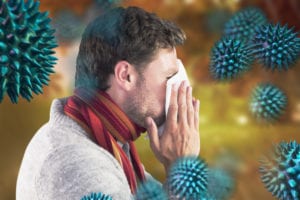Written by Angeline A. De Leon, Staff Writer. Seasonal allergies were significantly reduced in participating allergy sufferers who supplemented with a combination of L. Gasseri KS-13, Bifidobacterium bifidum G9-1, and B. longum MM-2 for 8 weeks during the spring allergy season.
 Commonly known as seasonal allergies or hay fever, allergic rhinitis develops as a result of inflammation in the nasal passages, frequently caused by an overreaction of the immune system to allergens in the air 1. Symptoms of an allergic response involve itchy, watery eyes, sneezing, and nasal congestion, the chronic effects of which may adversely affect quality of life on a day-to-day basis. Common among individuals with allergic rhinitis are problems with sleeping, reduced productivity in the workplace, and emotional distress 2. Preliminary meta-analyses suggest that probiotics may have the potential to improve quality of life in chronic allergy sufferers 3,4, although more research is required to determine the efficacy of existent strains. Previous studies have shown that a combination of three specific probiotic species (Lactobacillus. Gasseri KS-13, Bifidobacterium bifidum G9-1, B. longum MM-2), when ingested by older adults, leads to increased blood levels of IL-10, a cytokine associated with the development of tolerance to allergens 5. Based on findings, researchers at the University of Florida (2017) conducted a clinical study to confirm the immune-related benefits of these three strains using a combined supplementation regimen and a rhinoconjunctivitis-specific assessment of the quality of life of patients with seasonal allergies.
Commonly known as seasonal allergies or hay fever, allergic rhinitis develops as a result of inflammation in the nasal passages, frequently caused by an overreaction of the immune system to allergens in the air 1. Symptoms of an allergic response involve itchy, watery eyes, sneezing, and nasal congestion, the chronic effects of which may adversely affect quality of life on a day-to-day basis. Common among individuals with allergic rhinitis are problems with sleeping, reduced productivity in the workplace, and emotional distress 2. Preliminary meta-analyses suggest that probiotics may have the potential to improve quality of life in chronic allergy sufferers 3,4, although more research is required to determine the efficacy of existent strains. Previous studies have shown that a combination of three specific probiotic species (Lactobacillus. Gasseri KS-13, Bifidobacterium bifidum G9-1, B. longum MM-2), when ingested by older adults, leads to increased blood levels of IL-10, a cytokine associated with the development of tolerance to allergens 5. Based on findings, researchers at the University of Florida (2017) conducted a clinical study to confirm the immune-related benefits of these three strains using a combined supplementation regimen and a rhinoconjunctivitis-specific assessment of the quality of life of patients with seasonal allergies.
A total of 173 participants (mean age = 27 years) reporting seasonal allergies were enrolled in a prospective, randomized, double blind, placebo-controlled clinical trial. Subjects were randomized to receive either a probiotic consisting of 1.2 billion CFU L. Gasseri KS-13, 0.15 billion Bifidobacterium bifidum G9-1, and 0.15 billion B. longum MM-2 or a placebo capsule containing 348 mg potato starch daily for eight weeks during the spring allergy season. The rhinoconjunctivitis-specific quality of life questionnaire (MRQLQ) was administered on a daily and weekly basis throughout the duration of the trial. Pollen indices were recorded two weeks prior to the beginning of the study and on the final day of the study to verify the peak of allergy season.
Between-group analyses revealed a significant improvement on global MRQLQ score for the probiotic group (-0.68 +/- 0.13), relative to placebo (-0.19 +/- 0.14), from baseline to pollen peak (p = 0.0092). Unlike placebo, the probiotic group also demonstrated a reduction in overall reported symptoms (p < 0.0001), nose irritation (p < 0.0001), and activity interference (p = 0.0002). Although measured at baseline and Week 6, no significant changes were observed in immune markers.
Findings from the study provide evidence to support the benefits of using a specific probiotic combination to alleviate symptoms of self-reported season allergies. Lactobacillus. Gasseri KS-13, Bifidobacterium bifidum G9-1, B. longum MM-2 were found to significantly reduce the adverse effects associated with allergies even during the climax of allergy season. However, given the lack of significant findings reported on immune markers measured in the study, further research is warranted on the impact of this specific probiotic regimen on immune function.
Source: Dennis-Wall JC, Culpepper T, Nieves Jr. C, et al. Probiotics (Lactobacillus. Gasseri KS-13, Bifidobacterium bifidum G9-1, B. longum MM-2) improve rhinoconjunctivitis-specific quality of life in individuals with season allergies: a double-blind, placebo-controlled, randomized trial. Am J Clin Nutr. 2017; 105: 758-767. DOI: 10.3945/ajcn.116.140012.
© 2017 American Society for Nutrition
Posted December 18, 2017.
References:
- Juniper EF, Guyatt GH. Development and testing of a new measure of health status for clinical trials in rhinoconjunctivitis. Clinical & Experimental Allergy. 1991;21(1):77-83.
- Juniper EF, Ståhl E, Doty RL, Simons FER, Allen DB, Howarth PH. Clinical outcomes and adverse effect monitoring in allergic rhinitis. Journal of allergy and clinical immunology. 2005;115(3):S390-S413.
- Costa D, Marteau P, Amouyal M, et al. Efficacy and safety of the probiotic Lactobacillus paracasei LP-33 in allergic rhinitis: a double-blind, randomized, placebo-controlled trial (GA2LEN Study). European journal of clinical nutrition. 2014;68(5):602-607.
- Peng GC, Hsu CH. The efficacy and safety of heat‐killed Lactobacillus paracasei for treatment of perennial allergic rhinitis induced by house‐dust mite. Pediatric Allergy and Immunology. 2005;16(5):433-438.
- Spaiser SJ, Culpepper T, Nieves Jr C, et al. Lactobacillus gasseri KS-13, Bifidobacterium bifidum G9-1, and Bifidobacterium longum MM-2 ingestion induces a less inflammatory cytokine profile and a potentially beneficial shift in gut microbiota in older adults: a randomized, double-blind, placebo-controlled, crossover study. Journal of the American College of Nutrition. 2015;34(6):459-469.

